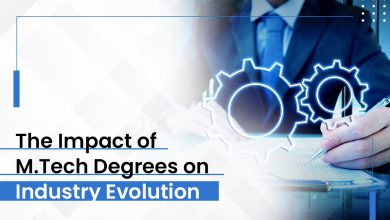B.Tech in AI: What You Need to Know Before Starting Your Journey

AI is reshaping the world, and staying ahead requires the right tools. Pursuing a degree like B tech in artificial intelligence provides students with the ability to design intelligent systems. However, understanding the scope, challenges, and opportunities in this transformative field is crucial before leaping.
- According to NASSCOM, AI Market in India is estimated to touch $900 billion by 2026.
- Over 1.2 million AI roles will be generated in India by the year 2026.
- Standard IT job roles on average get paid ₹3–12 lakhs on an annual basis.
Course Structure: B.Tech in AI Curriculum: Theory and Practice
AI & Computer Science combines the principles of computer science with the advanced subjects of AI such as machine learning, deep learning and data analytics. Top university in mumbai prepares students with the knowledge and skills required to create intelligent systems, automate processes, and participate in AI-driven technological advances used in a variety of sectors.
Foundational Subjects
- Tools & Languages: Learn Python, R, and data structures to build scalable AI models. Proficiency in these languages allows for efficient design of algorithms, manipulation of data, and optimization of models for practical AI implementations.
- Mathematics for AI: Linear algebra, calculus, and statistics are very important in machine learning. Models and mathematical frameworks of these concepts hold the power behind AI, as well as predictive modeling, pattern recognition, optimization within complex datasets.
Advanced Modules
- Machine Learning: Create algorithms for predictive modeling and classification tasks. These models enable businesses and industries to make more accurate data-driven decisions — from providing medical diagnostics to analyzing customer behavior.
- Computer Vision: These technologies are capable of processing visual data that is used in advanced security, autonomous navigation, and real-time object detection in multiple use cases.
Top AI engineering colleges in India offer hands-on labs where candidates work on real-world projects, such as supply chain optimization projects based on reinforcement learning.
In a competitive job market, these technical skills can open doors for various career opportunities. It is still true today, and from AI research to automation, professionals can implement their knowledge in all sectors to come up with developments and solutions to various complex technological problems.
AI Careers: Working in the Lab or the World
High Demand for AI Professionals — AI professionals are greatly demanded in virtually every sector from healthcare to finance and cybersecurity. At the top university in Maharashtra, students are also get taught about a different sector that is IT which covers the integration of creativity and technical brilliance, helping people innovate, enhance processes, and spearhead development for AI-driven approaches.
Industry Roles
- AI Developer: Work as an engineer developing algorithms, for instance, powering recommendation engines or doing healthcare diagnosis. Top tech companies hire graduates from BTech in AI colleges in India to improve cloud infrastructure.
- Data Scientist: Data scientists analyze large samples of raw data to help professionals adopt action-oriented, data-driven approaches to inform strategic processes, decision-making, and industry best practices.
Emerging Fields
- Ethics Consultant for AI: A graduate of a leading AI university ensures that A.I. technologies like hiring algorithms and credit-scoring systems are fair. This is where ethics consultants help organizations build ethical, impartial, and fair solutions by addressing bias and transparency.
- The Robotics Engineer: Robotics engineers design smart machines and build them to help automate industrial processes, resulting in increased productivity and minimization of human intervention in mass production. Aspiring Robotics engineers can acquire the skills required to thrive in this profession through AI courses in Mumbai.
AI and machine learning colleges in India focus on getting integrated with tech firms as interns so that students can put their classroom expertise into practice and solve real-world problems, such as optimizing energy grids or accurately diagnosing diseases in telemedicine.
Ethical Considerations and Challenges
Innovation is fast-paced with AI, leading to technical and ethical challenges. Future engineers need to extract the good out of problems such as bias, data privacy, and the security needed to keep AI development responsible. With a theoretical basis in ethics and technical tools, BSc AI colleges in Mumbai enable students to construct transparent and positive AI solutions that give back to society.
Technical Hurdles
- Data Quality: AI is heavily dependent on vast and unbiased data for proper training. For those with limited digital infrastructure, data scarcity becomes a hurdle in impacting model ability well and also reducing AI-supported decisions reliability.
- High Computational Costs: Building AI models requires many high-performance GPUs and various cloud resources that hike the project cost. Therefore, it is important to optimize the efficiency of the model being used and choose appropriate cost-effective resources for sustainable and scalable implementation of AI.
Ethical Implications
- Artificial Intelligence: Gender classifiers in machine learning systems may misidentify women or color. It is the engineers’ responsibility to use AI fairness measures and minimize biases in the development of accurate, inclusive recognition models, leading to responsible deployment of technology.
- Job Displacement: Traditional workflows are disrupted through AI automation by industries such as customer service. Workers require new skills; without them, they cannot keep their jobs and are left behind, or worse, displaced economically by automation.
To address these issues, leading AI ML colleges in Mumbai offer courses on ethical AI, equipping graduates to develop systems that prioritize transparency and benefit society.
Conclusion
BTech in AI is not just a degree; it’s a pledge to responsibly build the future. There is limitless potential in this field, from life-saving medical AI to sustainable smart cities. It is through your ethical engineering that future algorithms can better help the planet. You can do innovate or something meaningful in the field of society with B tech artificial intelligence colleges offer limitless opportunities. Are you up for the challenge, and being part of building a better grail future — with ethical AI development?
FAQs
- What are the eligibility requirements for B.Tech in AI?
Candidates must have a solid background in mathematics, physics, and elementary programming.
- Is it possible to study AI without a computer science background?
Yes, though you usually need to take foundational courses in coding and algorithms.
- What are those industries that Recruit AI Engineers?
Health care, finance, automotive, retail, and entertainment.
- Do I need a PhD for a job in AI research?
Preferred, but not required, for advanced R&D positions.
- What is the difference between AI and machine learning?
Artificial Intelligence (AI) is a wider science of making intelligent systems, machine learning is a statistical technique to enable AI.




